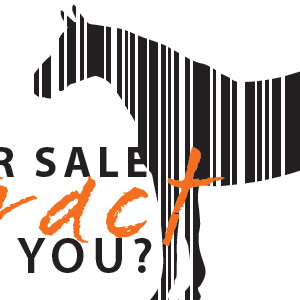If you’re selling a horse, you need to know how to protect yourself from potential legal action. That means you need a carefully drawn out sale contract. We regularly consult with horse sellers who have unhappy buyers threatening to sue them, and the most important factor in the sellers’ defense is the written sale contract between them and the buyers. Here are the elements we look for.
DID THE BUYER SIGN THE SALE CONTRACT?
This sounds obvious, but horse sales often happen quickly, and it can be easy to overlook getting the buyer’s signature on the sales contract. However, if the buyer didn’t sign the contract, the seller will have a very difficult time trying to enforce its terms against the buyer.
WAS THERE A WARRANTY DISCLAIMER? IS IT EFFECTIVE?
For all horse sellers, disclaimers can provide an affirmative defense to breach of contract claims. For trainers, breeding farms and others who regularly sell horses as part of their business, warranty disclaimers can also provide a defense to claims brought under the Uniform Commercial Code, such as breach of the warranty of fitness for a particular purpose. Note, however, that no disclaimer can provide an effective defense to fraud claims.
While almost any disclaimer language is better than not having a disclaimer at all, detailed disclaimers provide a much better legal defense than simple ones like “as is”. Here is an example of a more detailed (and therefore more effective) disclaimer:
Seller makes no warranties, express or implied, including the warranties of merchantability and fitness for a particular purpose. Seller expressly disclaims any statements that may have been made to Buyer regarding Horse, except for any statements that may be contained in this contract.
Note that all disclaimer language should be in a font size that is at least as big as the rest of the contract, and in bold, italics or all caps. The idea is to make the disclaimer language so prominent that it would be nearly impossible for the reader to miss.
DOES THE SALE CONTRACT DISCLOSE THE HORSE’S PROBLEM?
In some cases, a buyer is unhappy with a horse because of a behavioral quirk or soundness issue that the seller says he/she disclosed to the buyer at the time of sale. If the seller disclosed the problem to the buyer, and the buyer decided to purchase the horse anyway, that disclosure provides the seller with a legal defense. To make sure it’s easy to prove what they disclosed about the horse, smart sellers put all disclosures in the sale contract. The more detailed the disclosures are, the better protection they will provide for the seller. For example:
Horse has a history of biting other horses, and some bites have caused serious injuries. While the seller has observed this behavior at feeding time, the horse may bite at any time. Accordingly, the buyer should take appropriate precautions to ensure the safety of other horses.
ARE ALL THE TERMS IN THE CONTRACT?
In most horse sale transactions, before the sale occurs, the seller and buyer exchange phone calls, emails, texts and/or Facebook messages about the horse. Without a clause that says all the sale terms are in the sale contract, the buyer may be able to assert a claim that any representations the seller might have made during these calls, emails, etc. were important terms of the sale. Here’s an example of a “four corners” clause:
This contract contains the entire agreement among the parties. Any modifications must be in writing and signed by all parties to the agreement. No oral modifications will be effective unless reduced to writing and signed by all parties.
IS THERE AN ATTORNEY FEE CLAUSE?
In most states, winners of breach of contract lawsuits don’t automatically get to collect their attorneys’ fees and costs from the loser. As a result, a horse seller who successfully defends a lawsuit over a $12,000 horse might spend $70,000 in attorneys’ fees and costs, with no hope of ever recouping those expenses. For that reason, a seller might choose to settle a horse sale dispute, even if the buyer’s claims have no merit. However, that all changes if the sale contract at issue contains an attorneys’ fees and costs clause like the following:
In any legal action brought in connection with this agreement, the prevailing party(ies) will be entitled to prompt payment of expenses from the non-prevailing party(ies) following fi nal adjudication in favor of the prevailing party(ies). For the purposes of this section, “expenses” will include the following costs actually incurred by the prevailing party(ies): Reasonable attorneys’ fees, retainers, court costs, transcript costs, fees of experts, witness fees, travel expenses, duplicating costs, printing and binding costs, telephone charges, postage, delivery service fees and all other disbursements.
WHERE CAN THE BUYER SUE THE SELLER?
Without a clause in the sale contract saying where the parties must bring any dispute, an unhappy horse buyer will probably have some choices about where to sue the seller, and some of those choices may be very inconvenient and expensive places for the sellers to defend a lawsuit. Here’s an example of what is called a “venue” clause:
This agreement shall be governed by the laws of X state. The parties agree that any legal disputes brought in connection with this agreement must be brought in X County, X State.
By keeping the above points in mind, you can develop a better sale contract (ideally with the help of an equine attorney) that will help protect you should difficulties arise after you have sold a horse.
Rachel McCart is a lifelong horsewoman, an equine attorney and the founder of Equine Legal Solutions, PC, a law fi rm dedicated to the equine industry. Rachel is a member of the New York, California, Oregon and Washington State bars and is also admitted to practice before the U.S. District Court for the District of Oregon. For more information about horse sale contracts, including ready-to-use equine legal forms and customized contracts, visit Equinelegalsolutions.com.








